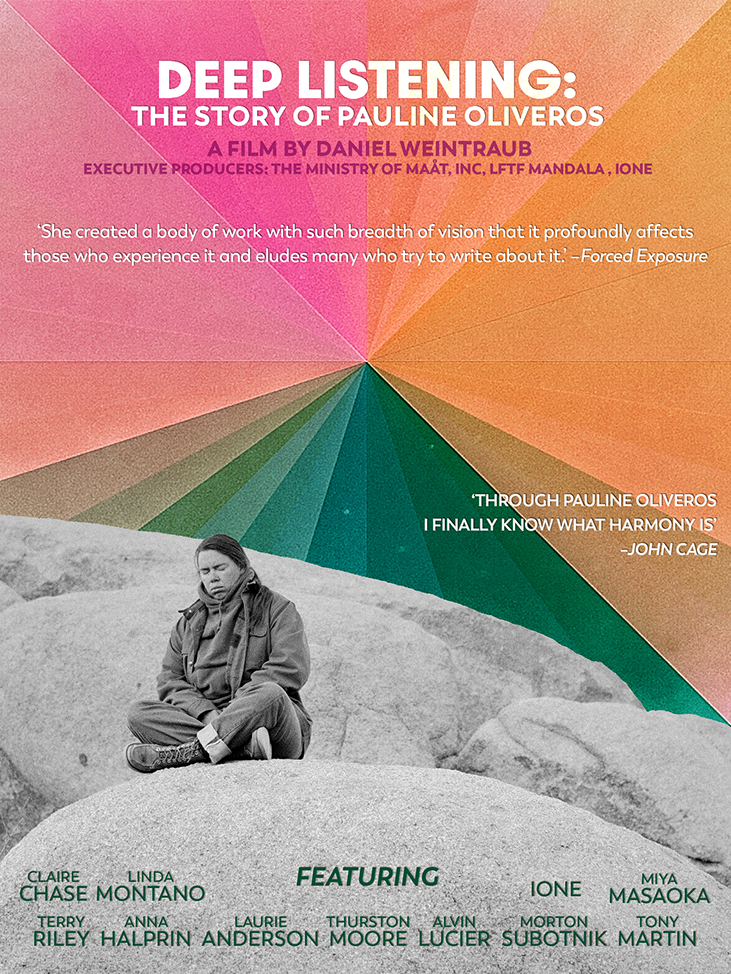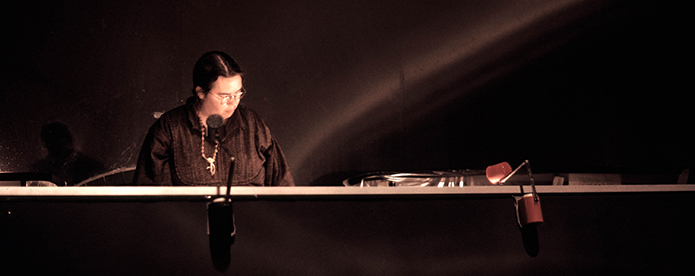


A DOCUMENTARY FILM PROJECT ON THE LIFE AND WORK OF AMERICAN ICON PAULINE OLIVEROS
"Luminous."
- Laurie Anderson
"Weintraub's film, which largely allows Oliveros herself to tell her story and explain her discoveries and ideas through recorded interviews that are peppered with commentary from her peers (Riley, Morton Subotnick) and disciples (Thurston Moore), is never at odds with the central tenets of the Deep Listening ethos. In fact, it leaves the viewer not only wanting to explore her music further, but to pay more attention to the sounds around them—something the composer no doubt would have appreciated."
--- Chronogram

HELP US PROMOTE AND SCREEN THE FILM AND COVER LEGAL COSTS
TAX DEDUCTIBLE CONTRIBUTIONS CAN BE MADE VIA www.ministryofmaat.org
SCREENINGS
festivals: Cine Paris (Best Director), Something Wicked Doc Fest (Best Director), Unerhört! Music Film Festival, Doc N' Roll, In-Edit Barcelona, Sonika Ekrano (Closing Night Film), In-Edit Barcelona, South Sound Film Festival, Rockumenti, Nonagon, Non-Event, Suoni Per i Polpolo, Poesía en Vox Alta, Venus Fest, Sonic Vigil XI, Huddersfield Contemporary Music Festival, MaerzMusic Festiva
other screenings: NYC, Boston, Berkshires, Philadelphia, California (various), Maine, Santa Fe, Seattle, Cincinnati, Austin, Mexico, Germany, UK, Spain, Portugal, Sweden, Finland, Belgium, Canada, Ireland, Iceland
UPCOMING:
1/27/24 at New Media Contemporary - Dallas, Texas
1/28/24 at Museum of Fine Arts - Houston, Texas
1/28/24 at Dark Music Days - Iceland
1/31/24 at Sibelius Museum - Finland
2/6/24 at SUNY New Paltz - New Paltz, NY
2/9/24 at Shadowbox - Durham, NC presented by Slingshot Festival
2/18/24 at Cinematek Bergen - Bergen, Norway
2/18/24 at Moviate - Harrisburg, PA
2/29/24 at Pomona College, Claremont, CA
3/7/24 at Paradise Theatre - Toronto
3/9/24 at Gene Siskell - Chicago
3/9/24 at Ottawa
3/14/24 at Simon Fraser - Vancouver
3/23/24 at Cafe Oto - London
4/1/24 at Festival Variations - Nante, France
5/31/24 at UCSD - San Diego, CA


Why make a film about Pauline Oliveros?
Through Pauline Oliveros and Deep Listening, I finally know what harmony is…It’s about the pleasure of making music.
- John Cage, 1989
Pauline Oliveros, a distinguished American composer who played a major role in the development of experimental music, passed away peacefully on November 24, 2016. Born in 1932 in Houston, Texas, Oliveros pioneered collaborative mixed-media compositions with electronic sounds, light projections and theatrical elements during the 1960s. She also created tape music compositions now considered classic works in the history of electronic music and contributed to the early development of free improvisation. Oliveros embraced the infinite variety of sounds in our world. She viewed this sonic multiplicity as a “a grand composition” and was committed to developing and teaching perceptual skills that made it possible for both musicians and non-musicians to appreciate this global “sound environment.” She extended this praxis to “Deep Listening,” a form of meditative art that focuses not only on the sounds of the external world, but also on the more ephemeral sounds of our innermost thoughts. Listening, for Oliveros, is a foundation for collaborative work and a means to form communities, which can cultivate an appreciation of human diversity. This film will powerfully convey Oliveros’ profound message at a time in human history when it is most needed.
- David W. Bernstein, Head of Music Department, Mills College
In this time of divisiveness and disillusionment, we hear again and again the complaint that the American public feels it is “not being listened to.” Pauline Oliveros dedicated her entire life to providing an antidote for this very malaise. The world could certainly use her presence right now, but sadly she is no longer with us to offer her council. “Deep Listening: The Story of Pauline Oliveros,” has thus become a crucial conduit for passing along Pauline’s wisdom and illuminations.
To those who encountered her, or are familiar with her work due to a knowledge of the avant garde and contemporary American music, Pauline was an indisputable giant of the American arts. It can be easily argued, in fact, that there is no other post-war artist who contributed so much to the cultural landscape. Pauline can easily be elevated to elite status simply for her work as a composer. However, that barely scratches the surface of her contributions. In her unusually prolific six decade career, Pauline also made invaluable contributions as a groundbreaking improviser, multi-media guru, technological innovator, writer, teacher, mentor, philosopher, humanitarian and as an advocate for women and people with disabilities.
While Pauline has been widely recognized by a variety of institutions, it is the filmmaker’s hope that “Deep Listening: The Story of Pauline Oliveros”, can broaden that recognition to the public as a whole. Perhaps, through Pauline, we can all learn to really listen.
Director's Statement
Pauline and I shared the feeling that her story was made for me to tell. I looked for many years for a subject about which to do my first feature length documentary. When my neighbor in upstate New York introduced me to Pauline, I knew I had met a person who would inspire me throughout the inevitably lengthy process of making a film. I also felt an instant obligation to share the story of this incomparable sonic icon. In the
process of making this film, Pauline and I became close friends. Through Pauline, I found a language to explain and express thoughts I had entertained my whole life around the importance of listening and how that can impact and expand community.
I also had the good fortune to follow Pauline for nearly three years, filming rehearsals, workshops, performances, recording sessions, and various community activities. I saw how she inspired an expansive creativity within her community in Kingston, NY and with the world class musicians she regularly created work with. In addition, I filmed over thirty interviews. With Pauline ‘s guidance and her warm reputation, I was able to
record interviews with artists whose cultural impact is comparable to Pauline’s. In Pauline’s absence, her creative partner and spouse IONE, trustees and community, all offered their continued support and guidance to tell Pauline’s story the best way I could posthumously.
Now that Pauline has left this plane, I feel an even greater obligation to tell her story. I can think of few other people of the last century whose message of healing, unity and unbridled creative expression is more deeply needed at this time in history. I am so honored to have been in conversation with her and have the experience and ability to capture some essence of Pauline, that can be shared in the world now through this independent film.
I dedicated my life to music and filmmaking from an early age. In all those years, I never met a subject like Pauline Oliveros, whose compelling story and life’s work provided me with such a perfect opportunity to align both my passions. I felt it crucial, when making this film about Pauline, to whom listening is the center of her private and artistic world, that I as the filmmaker contribute my knowledge of music and sound recording, and to be an editor who listens. I believe Pauline chose to work with me on this documentary film because of my experience as
a recording engineer, and the way I present sound in my films. Soon after we met, Pauline invited me to mix a recording of her with friend and collaborator Miya Masaoka, and to record and mix a trio with Nels Cline and Thollem McDonas, which turned out to be Pauline’s final recording.
As Pauline herself said “I never tried to build a career, I only tried to build a community”. As an artist coming of age in the 1950’s as a woman who identified as queer, Pauline had to overcome many obstacles placed in front of her by society. She did this largely by always being committed to the idea that, through their art, artists have a responsibility to bring people together. During her life, Pauline built an incredible world-wide community.“Deep Listening: The Story of Pauline Oliveros” is not only a film about a crucial piece of American cultural
evolution, but a vehicle through which we can continue to expand Pauline’s community and its commitment to listening and understanding.

PLEASE ENJOY THIS SHORT FILM BASED ON PAULINE'S 1970 ARTICLE IN THE NEW YORK TIMES:
"DON'T CALL THEM LADY COMPOSERS". FEATURING A MIGHTY ALLSTAR CAST
HERE IS A SHORT FILM I PUT TOGETHER ABOUT PAULINE'S INSTALLATION AT THE 2014 WHITNEY BIENNIAL